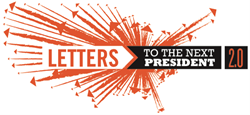PBS, National Writing Project Platform Allows Teens to Voice Opinions on Presidential Election
Educators across the nation have created an online publishing platform for teens to voice their opinions on issues that matter to them in the coming presidential election. Jointly hosted by PBS member station KQED and the National Writing Project (NWP), the Letters to the Next President 2.0 (L2P 2.0) website enables teens to publish letters and practice civic engagement.

Source: L2P 2.0.
The L2P 2.0 website seeks to empower teens to research, write and make media letters. “From immigration policy to the environment, education to health care, young people have a space to share their perspectives with peers and a global community of interested followers,” according to a prepared statement.
“Letters to the Next President 2.0 has been developed by educators who understand that civic engagement is valuable in its own right,” said Elyse Eidman-Aadahl, executive director of NWP, in a prepared statement. “When we give students a platform to speak out on issues, we provide them with a powerful and authentic purpose for learning, writing and media making. The initiative provides a wealth of resources and support for educators, in school and beyond, and thanks to the power and reach of digital publishing, it provides the nation with a real-time window to what teens care about.”
To participate in L2P 2.0, educators or adult mentors need to create an account and then invite students to register. The website is currently accepting student submissions until Election Day on Nov. 8. The letters are available to the public now through the next president’s first 100 days of office.
To view the letters or learn more about the project, visit the L2P 2.0 site.
About the Author
Sri Ravipati is Web producer for THE Journal and Campus Technology. She can be reached at [email protected].